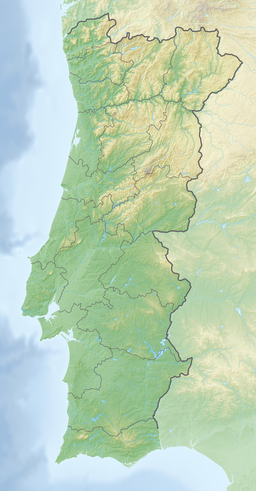Ria de Aveiro
This article needs additional citations for verification. (September 2014) |
| Aveiro Lagoon | |
|---|---|
 A view of the Aveiro Lagoon | |
| Location | Portugal |
| Coordinates | 40°35′55.89″N 8°44′46.49″W / 40.5988583°N 8.7462472°W |
| Type | lagoon |
| Max. length | 45 kilometres (28 mi) |
| Surface area | 75 square kilometres (29 sq mi) |
The Aveiro lagoon (Ria de Aveiro) is a lagoon in Portugal. It is located on the Atlantic coast of Portugal, south of the municipality of Espinho and north of Mira (to the north of the Cape Mondego). Its average area covers approximately 75 square kilometres (29 sq mi). It is named after the city of Aveiro, which is the chief urban centre located near to the lagoon. Other urban centres near the Ria de Aveiro are Ílhavo, Gafanha da Nazaré, Estarreja, Ovar and Esmoriz. Some beaches nearby include those of Barra, Costa Nova, Torreira, Vagueira, Furadouro, Cortegaça and Praia de Mira. There are also beaches in the São Jacinto Peninsula.
The Aveiro Lagoon is beyond a mere geographical feature of Portugal. This 45 kilometres (28 mi) long lagoon stands as one of Europe's last remaining untouched coastal marshland. It is also a haven for numerous bird species. The locals call this rich lagoon Ria de Aveiro. Tourism and aquaculture are the mainstay of the Aveiro Lagoon region. It is also renowned for its artisan fishing and as a center for the collection of flor de sal, an expensive salt variety.[1]
Conservation
[edit]Ria de Aveiro is protected under the European Union's Natura 2000 network, under both the Habitats and the Birds Directives. Under the Birds Directive, it was designated a Special Protection Area (EU code PTZPEO004) in March 1988, based mainly on the importance of the area for waterbirds.[2] More recently, in August 2014 it was also proposed as a Site of Community Importance, under Habitats Directive (EU code PTCON0061).[3]
References
[edit]- ^ "Protecting Portugal's Aveiro Lagoon". European Grid Infrastructure. Retrieved 28 February 2013.
- ^ "Natura 2000 PTZPE0004 Standard Data Form". European Union. Retrieved 27 December 2024.
- ^ "Natura 2000 PTCON0061 Standard Data Form". European Union. Retrieved 27 December 2024.



